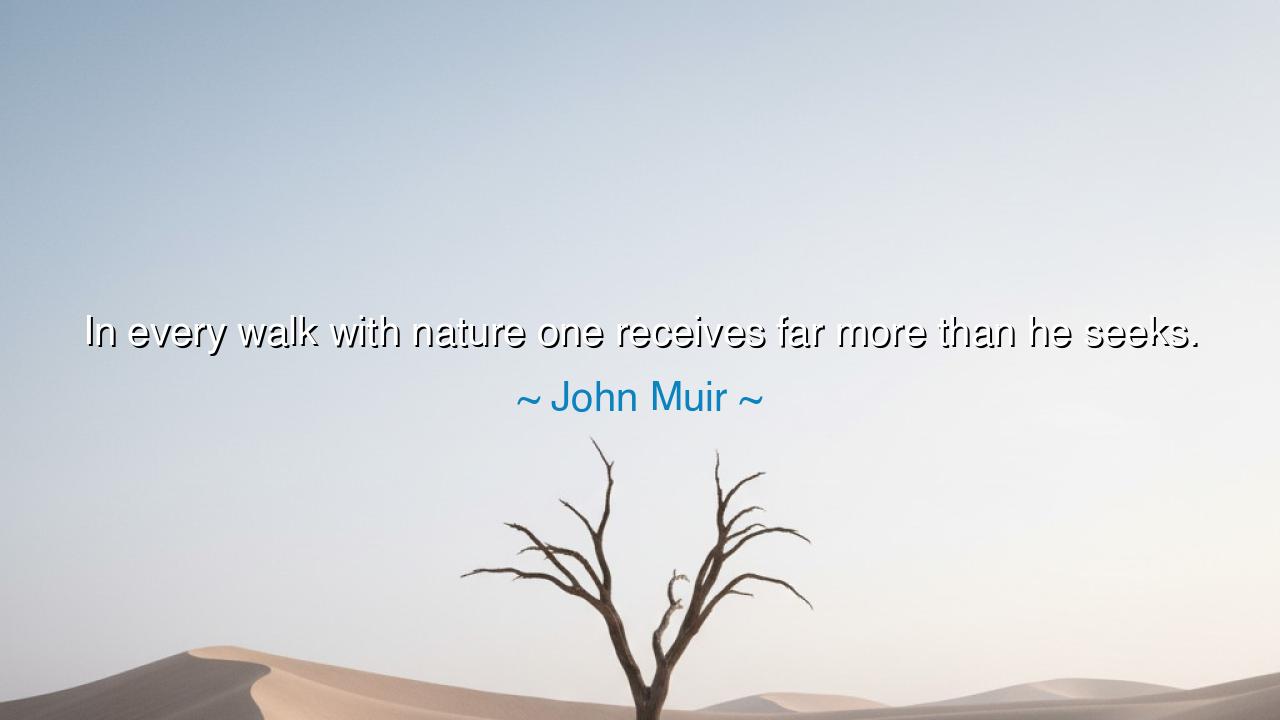
In every walk with nature one receives far more than he seeks.






John Muir, the prophet of the wilderness, once proclaimed: “In every walk with nature one receives far more than he seeks.” These words rise like a hymn, reminding us that the gifts of the earth cannot be measured only by what we set out to find. Man may enter the forest in search of wood, water, or food, but he comes away with peace, renewal, and vision. The rivers, the mountains, the trees—they give not only sustenance to the body but nourishment to the spirit.
O listener, hear the wisdom within: when you walk with nature, you do not merely observe her beauty—you partake in it. The breath of the forest becomes your breath, the silence of the hills your silence, the strength of the rock your strength. You may think yourself the seeker, yet it is nature who gives freely, and more abundantly than you imagined. This is why Muir, wandering through the Sierra Nevada, found himself overwhelmed by treasures of heart and mind he never sought—moments of awe that surpassed all intention.
Consider the tale of Henry David Thoreau, who withdrew to Walden Pond. He sought solitude, a simple life of reflection. But in his communion with nature, he gained more than simplicity: he gained insight into the human condition, into society’s illusions, into the eternal rhythms that bind man and earth. What began as an experiment in living became a spiritual awakening that has guided countless souls since. So too, Muir teaches us, the walker receives more than he seeks.
The origin of Muir’s quote lies in his own pilgrimages into the American wilderness. He did not walk as a conqueror but as a humble guest, and he discovered that the more he yielded himself to nature, the more she revealed. He went to climb mountains but came away with revelations about the divine order. He went to study flowers but found joy, humility, and the eternal presence of God in every petal. He went to seek knowledge but was granted wisdom. Such is the abundance of the natural world.
Yet, there is also warning here: modern man often enters the forest with blind eyes, seeking only resources to exploit—timber, gold, land. He sees only what he desires and misses the greater wealth that nature offers. Muir’s words call us back to reverence, to the understanding that the earth is not merely a storehouse of goods but a sanctuary for the soul. When you walk with nature, if your heart is open, you will find more than profit: you will find meaning.
The lesson, then, is this: do not approach nature only with expectation of gain, but with humility, wonder, and gratitude. Go to her not as a master but as a pupil. Listen to her rivers as though they were teachers. Watch the flight of birds as though they were prophets. Feel the wind as though it were prayer. In this way, you will not only receive more than you sought, but you will be transformed, awakened to truths deeper than words.
Therefore, children of tomorrow, walk often in nature. Seek her not only in distant mountains but in nearby fields, in the garden, in the sky above you. When weary, let her restore you. When confused, let her guide you. When hardened by the world, let her soften you. Do this, and you will discover—as John Muir did—that every step taken with nature is a step into abundance, a step into mystery, and a step into the infinite wealth of life itself.
For in truth, the gifts of nature are inexhaustible. You may enter her realm seeking little, yet you will leave with treasures beyond price: peace in your heart, clarity in your mind, and the quiet knowledge that you are part of something far greater than yourself. This is the miracle of every walk with nature—the miracle that John Muir gave to us, so we may remember it always.






AAdministratorAdministrator
Welcome, honored guests. Please leave a comment, we will respond soon